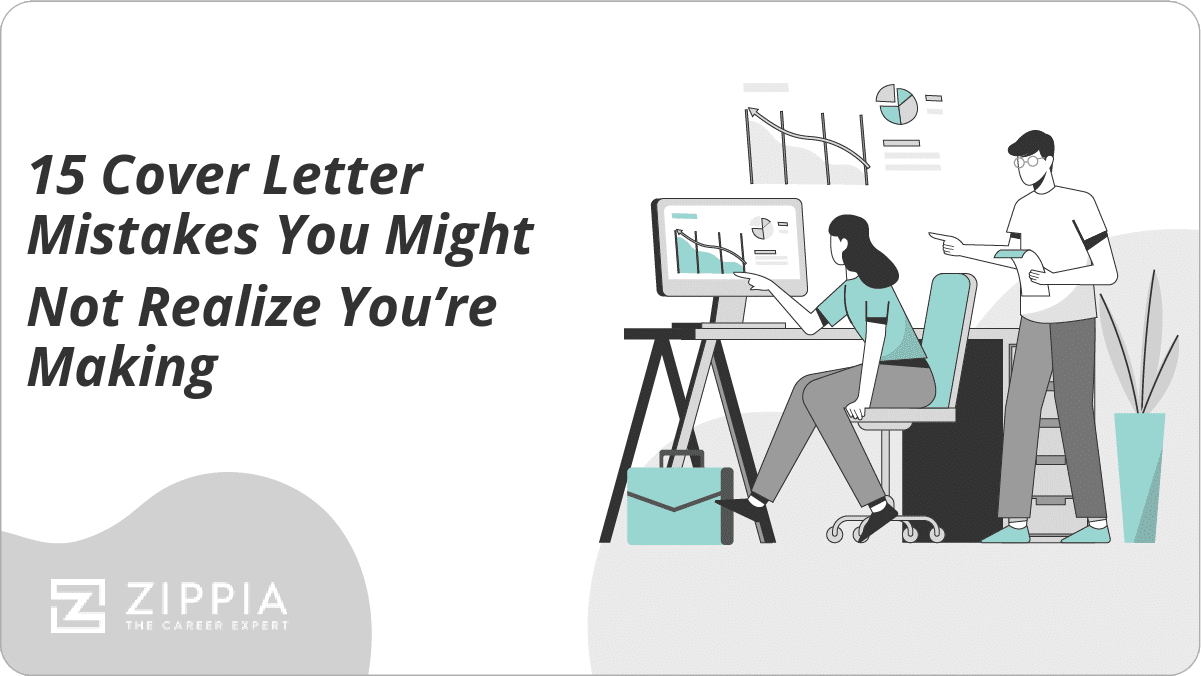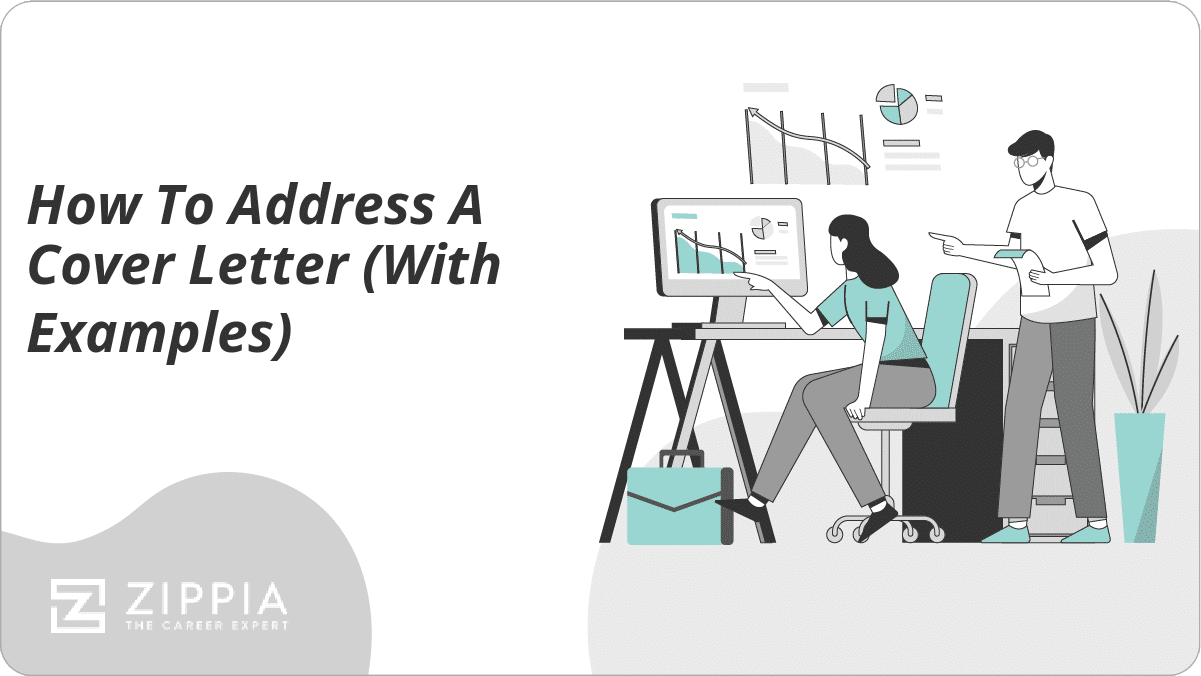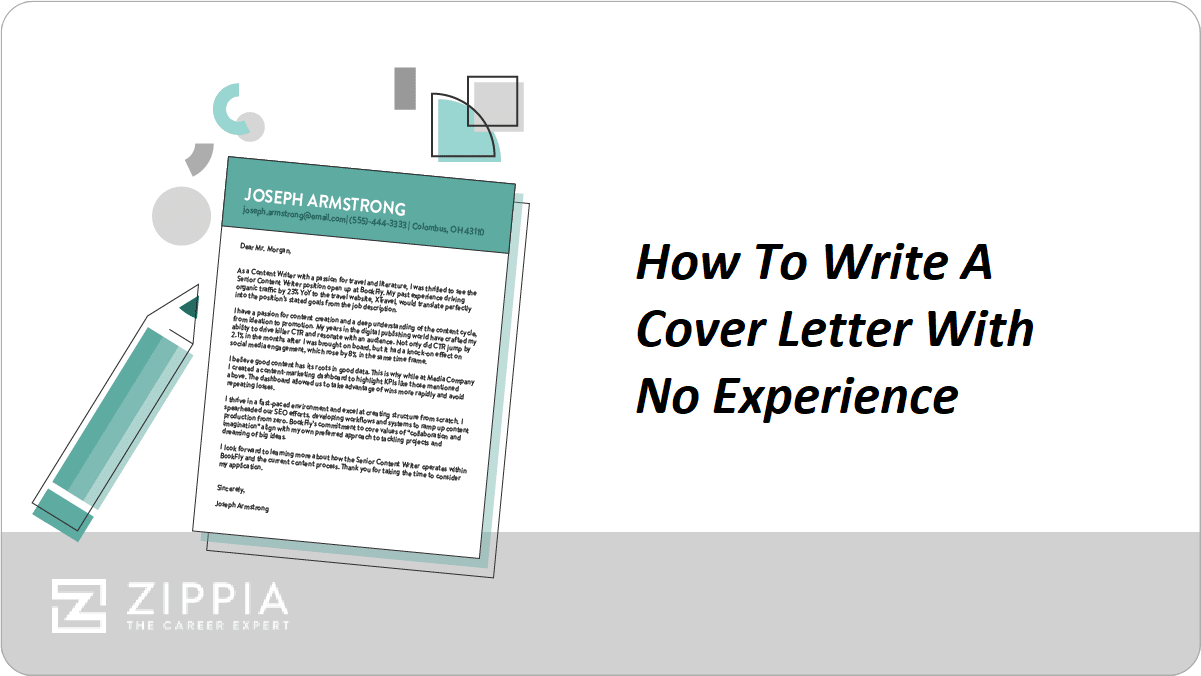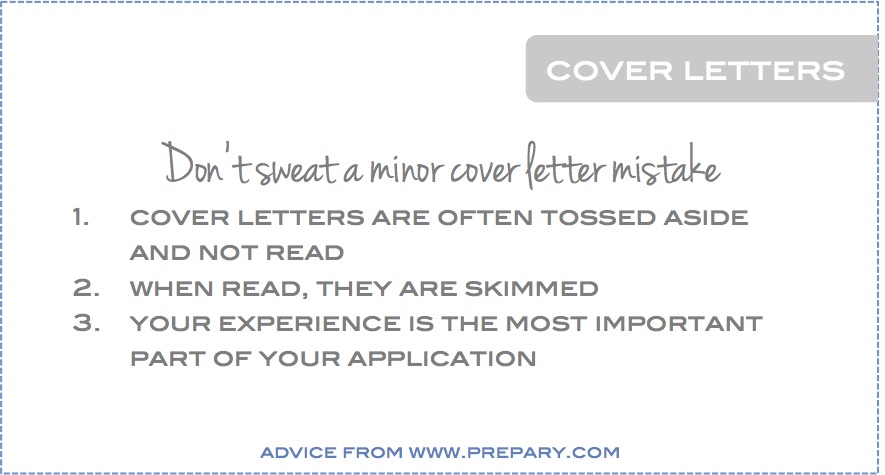
- Executive & Board Resumes
- Sample Resumes
- 100 Hot Tips


I Made a Mistake on My Cover Letter
A reader recently sent me this note: “I made a mistake on my cover letter; should I resend it?”
That made me think about the types of recoverable mistakes people make.
Spelling & Grammar Errors on Cover Letters
When I recruited, spelling and grammar errors were the most common cover letter mistakes I saw. There was usually at least one boo-boo per letter. Seriously.
Thus, I tended to give everyone a mulligan. Otherwise, it wouldn’t have been possible to complete searches.
That said, I encourage you to use Grammarly (not an affiliate) to spot your writing problems. Why? Because if you send an error-free letter, you will stand out in a good way.
Misaddressed Cover Letters
The other recoverable error I saw was the misaddressed cover letter. I received at least one on every search I did.
It happens when job seekers use the same letter template for multiple applications. Unfortunately, they go too fast and forget to change the recipients’ names and addresses in each letter.
Sadly, I can’t think of a time I interviewed an applicant who got my name wrong.
Instead, I wondered:
- Was the cover letter and resume meant for me?
- Did the letter and resume ever get to the right person?
Thus, think of misaddressing a cover letter as a deal killer unless you discover and fix the error.
Get it Right the First Time
Know that you’re human and English is hard. So please spell and grammar check your cover letters.
After you’ve done that, double-check the addressees. You probably won’t get an interview if your materials don’t go to the right people.
I Made a Mistake on My Cover Letter. Should I Resend It?
Now, circling back to the beginning of this post, that’s a great question!
I say, “Yes, definitely fix the error(s) and resend your letter.”
First, if you emailed your cover letter to the wrong addressee, correct the name and address. Then, send it to the right person.
Second, if you’re not that lucky, apologize for addressing the wrong person. If they don’t forgive your mistake, you probably don’t want the interview anyway.
Third, if you made a spelling or grammar error, fix it and resend your letter.
How Email Saves You from Your Cover Letter Mistakes
In the second and third cases, if you used email, you can note that you hit “send” too soon. That’s relatable because it’s something we’ve all done.
You Might Also Like
Everything That Matters About Cover Letters
Updated April 2024
© 2013 – 2024, Donna Svei . All rights reserved.

Donna Svei, an executive resume writer and former C-level executive, retained search consultant, and CPA, authors all of AvidCareerist’s posts.
She is a Fast Company Contributor and has written for and been quoted by 100+ business and general media outlets, including Forbes, Inc., Entrepreneur, CNBC, the New York Times, USA Today, Time, US News & World Report, CBS, the BBC, Lifehacker, Social Media Today, IT World, and Business News Daily.
Let her expertise inform your job search strategy and decision-making.
Contact Donna here to learn more about her resume and LinkedIn profile services and fee structure.
Comments 14
Now there’s a coincidence. Just last week I sent a cover letter, and it took me AGES to find the guy’s name, searching various online documents until I found it in the company accounts. Just hope I got the right name.
I’m astonished it’s this common! I was expecting the “Dear Sir or Madam” gaffe to be it.
I hope so too!
Can you say more? Do you mean “make the effort as Tricia did to address your cover letter to a person?”
On LinkedIn when you apply for a job it automatically populates your cover letter with the last cover letter you sent out. I thought it was a good idea at first because I could use some of the same wording from my last cover letter. But….I forgot to change a name and I did not catch it until a few days later. I was horrified! The worst part was I really was interested in the job! Painful! Now every time it auto populates I cringe!
That’s good to know — and to watch out for. Thank you for sharing.
Of all the potential mistakes one could make on the cover letter, this one is THE cardinal sin. I mean, spelling or grammatical errors are bad enough.
It’s the “template mentality” — there’s no one size fits all solution to cover letters, that’s why they’re included with the resume. Cover letters should be tailored to the specific post, company, and the person who’s going to hire you. You should be answering what the person has questions about, and how you’ve met challenges etc. Sometimes, it’s the cover letter that makes a difference when it comes to hiring decisions.
The couple of templates I have saved for cover letters I put Dear (your name here)
Then when I read through before sending, it becomes obvious if I haven’t filled this in.
Yuyu and Tricia,
Thank you for the additional insight on templates. Handy but dangerous tools!
What are your suggestions for those of us sending coverletters to an unknown reviewer in HR. Is “To Whom it May Concern, Dear Sirs, Dear Sir or Madam, etc” acceptable?
I like “Dear Sir or Madam” or “Dear Recruiter.”
If there’s a search committee, then “Dear Search Committee.”
“To Whom it May Concern” is a little too anonymous.
Hope this is helpful,
Hi Donna, I’ve addressed the cover letter and been interviewed by someone completely different. I apply to same place a year later and their HR changes. I believe that sometimes when there is no number to call and to inquire on the HR name one should use a general name ( Dear Talent Team) but some have many people in HR too. It’s a team and it really depends on situation. The trick is being noticed and being called for the interview and than shining above all the rest. It’s hard I know one day I’ll get hired!
Hi Lydalyn,
All good info. Unfortunately, I often get letters addressed to a specific person at an entirely different company! Thank you for helping me clarify
Kind regards,
I always try not to make this mistake. Even forwarding any Email I always update the name and cross check before sending. Due to this reason I have never make this mistake. Sometimes I catch the mistake while cross checking…
Good advice. Thank you Vivek.
Leave a Reply
Your email address will not be published. Required fields are marked *
11 Common Cover Letter Mistakes to Avoid at All Costs

When it comes to the job application process, cover letters are as relevant as ever.
They complement your resume and can effectively set you apart from a sea of other candidates…
And yet, most job-seekers tend to make the same common cover letter mistakes (which can even cost them the job).
To prevent you from making the same mistakes, we compiled this list of job-seekers' 11 most common cover letter mistakes.
Avoid these mistakes, and you’re well on your way to landing your next job!
Ready? Let’s dive in!
11 Cover Letter Mistakes (That You Should Avoid)
Mistake #1. making it all about yourself.
“How can I not make it about myself,” you might think. “After all, this is my cover letter.”
Well, yes, but here’s the thing.
You should use your cover letter to better explain why you’re the perfect fit for the company, not as free space to talk about yourself. Think about what the recruiter wants to read, not only what you want to say.
Specifically, do talk about a few relevant strengths and noteworthy achievements that will highlight your skills for the position (that you couldn’t elaborate on your resume).
Don’t overuse “I,” don’t start sharing your life story as if your cover letter is your autobiography, and don’t come up with irrelevant competencies you just assume will make you look good. Huge cover letter mistakes.
Mistake #2. Repeating your resume
There’s a quote by Zig Ziglar that says: “ repetition is the mother of learning. ” Great quote, but it still doesn’t justify using your cover letter to repeat your resume.
Recruiters want you to prove that you’re worth the job. But if they open your cover letter and re-read your resume (which they’ve surely already read), you’d have made a big cover letter mistake.
If you have nothing new to say, you can explain in more detail how one of your achievements prepared you for the job you’re applying for, or how you can contribute to the company’s mission. Anything that will add value instead of just listing out your job history and responsibilities will do.
Want to promote your personal brand and make a lasting impression as a candidate? Match your cover letter with your resume! All of the Novorésumé resume templates come with a matching cover letter design. So, just pick a style you like and get started now!

Mistake #3. Exceeding one page
Your cover letter shouldn’t be an autobiography.
You might be tempted to go on and on and describe your entire career history, but that’s simply not what the cover letter is for.
A good cover letter has 3 main objectives:
- To (briefly) introduce you and your career goals
- To summarize your (relevant) professional background
- To explain anything that you didn’t have space for in your resume, but that the recruiter should know
As such, the ideal cover letter length is 250-400 words long or between three to six paragraphs .
Mistake #4. Mass sending a cover letter
Ideally, your cover letters should be tailored to each job that you apply for.
A generic cover letter that you just copy and paste from an internet sample shows you submitted one just because you have to, not out of genuine interest for the position.
Your cover letter should show that you put in the effort—that’s what makes all the difference.
If, however, you’re applying to many jobs and don’t really have the time to write, say, 20 cover letters, make sure to at least customize the company’s and the hiring manager’s name in each.
Wondering how to start off your cover letter? Our guides on how to start a cover letter can help you with that!
Mistake #5. Using cliches without backing them up
As you’re writing your cover letter, you might be tempted to use phrases like “I’m an excellent team player,” “dedicated problem-solver,” or “great communicator.”
Which is fair - these are very important skills but any job out there.
Here’s the thing, though: these buzzwords are used so often in resumes & cover letters today that they’ve become cliches.
Sure, you can claim to be a “great communicator,” but so do all the other applicants.
The only case we do recommend mentioning such cliches is when you can actually back them up with your past experiences.
So instead of saying “I’m a great communicator,” you say “I’m a great communicator, as proven by Experience A, B, and C.”
Developed teamwork skills by coordinating with 10 other people on my project team to develop and deliver software solutions for the client both behind budget and ahead of schedule.
Mistake #6. Being too formal...or too informal
Look, extremes are rarely your friend.
So, just like your instinct probably tells you that addressing the hiring manager like you would a friend isn’t the brightest idea, you should also refrain from being overly formal.
Dear Sarah,
I’d like to apply for the role of junior project manager at Company X.
Hey Sarah, what’s up?
Name’s John and I’m here for that project manager gig!
Our guide on how to address a cover letter shows you the best ways to address a cover letter without being overly formal, or informal.
Mistake #7. Typos and grammar mistakes
Out of all cover letter mistakes to avoid, typos and grammar mistakes should be the easiest.
Microsoft Word will underline your typos red and your grammar mistakes green, but you have the option of easily proofreading your cover letter no matter where you’re writing it.
A simple spell-checker and software like Grammarly should be enough to save you from this dreary, but easily avoidable, mistake.
Mistake #8. Unnecessary flattery
You don’t need to write a love letter to the company for the hiring manager to like you.
Sure, if you hold the company’s values, mission, or culture at a high standard, feel free to mention how it inspires you professionally.
But if you just use your cover letter to throw random compliments at the company with the hopes the recruiter will like you, you’re in for an unpleasant surprise.
Remember: you want to (smartly) flatter your achievements, not the company.
Mistake #9. Going off-topic
Going off-topic is a big no-no when it comes to cover letters.
You might think it’s OK, as long as you’re talking about work, but explaining the backstories of your professional decisions will get you nothing but a yawn from the recruiter.
For example, opening up to the hiring manager about how you decided to leave your job because you broke up with your girlfriend is (as you might imagine) totally going off-topic and definitely too much information (even if that’s the reason you did quit your job).
Generally, in your cover letter, refrain from discussing:
- Your weaknesses (unless they’re asking about them at an interview)
- Uncomfortable life/professional experiences
- Details of every job you ever had
- Reasons, excuses, or details on why you were fired from a past job (again, unless asked at an interview)
Mistake #10. Not following specific instructions
Did your teacher ever tell you to carefully read the test questions before starting to answer?
Rightfully so! Sometimes, we hurry so much to get something done that we completely miss what we are being asked in the first place.
You don’t want that cover letter mistake to happen to you, so read the job description carefully before you start writing your resume and cover letter.
If the hiring manager has any specific requirements about the cover letter’s content or format, you’ll find them in the job description. It might even happen that the position doesn’t require a cover letter at all, so give this part its due attention.
If the job description doesn’t provide any specifications, your best bet is to submit your cover letter in PDF format.
Want to go the extra mile and impress the recruiter with your attention to detail? Use the same design as in your resume.
Mistake #11. Forgetting to sign your cover letter
Signing your cover letter goes a long way to showing business etiquette and attention to detail, so make sure to do that!
If you’re sending your cover letter and job application as part of an email, though, then you don’t have to sign your cover letter.
In any case, pay extra attention to how you end your cover letter. People are bound to remember the ending of things, so you want to conclude your cover letter as politely and memorably as possible.
Not sure what that means? Our article on how to end a cover letter will show you all you need to know!
Key Takeaways
And that’s a wrap! We hope you know what cover letter mistakes to look out for when you start writing. Here are a few of the main points we covered:
- Don’t overuse “I” in your cover letter. Instead, focus on describing a few of your most noteworthy achievements, relevant to the position.
- Using your cover letter to repeat your resume is a cover letter mistake you must avoid.
- Avoid using cliches such as “team player,” “great communicator” and the sorts when you’re describing yourself. Instead, prove your skills by backing them up with your professional experiences.
- Make sure you proofread your cover letter before submitting it; typos and grammar mistakes are intolerable cover letter mistakes.
Related Readings:
- Top Cover Letter Examples in 2024
- How Long Should a Cover Letter Be?

To provide a safer experience, the best content and great communication, we use cookies. Learn how we use them for non-authenticated users.

- Appointments

- Resume Reviews

- Undergraduates
- PhDs & Postdocs
- Faculty & Staff
- Prospective Students
- Online Students
- Career Champions
- I’m Exploring
- Architecture & Design
- Education & Academia
- Engineering
- Fashion, Retail & Consumer Products
- Fellowships & Gap Year
- Fine Arts, Performing Arts, & Music
- Government, Law & Public Policy
- Healthcare & Public Health
- International Relations & NGOs
- Life & Physical Sciences
- Marketing, Advertising & Public Relations
- Media, Journalism & Entertainment
- Non-Profits
- Pre-Health, Pre-Law and Pre-Grad
- Real Estate, Accounting, & Insurance
- Social Work & Human Services
- Sports & Hospitality
- Startups, Entrepreneurship & Freelancing
- Sustainability, Energy & Conservation
- Technology, Data & Analytics
- DACA and Undocumented Students
- First Generation and Low Income Students
- International Students
- LGBTQ+ Students
- Transfer Students
- Students of Color
- Students with Disabilities
- Explore Careers & Industries
- Make Connections & Network
- Search for a Job or Internship
- Write a Resume/CV
- Write a Cover Letter
- Engage with Employers
- Research Salaries & Negotiate Offers
- Find Funding
- Develop Professional and Leadership Skills
- Apply to Graduate School
- Apply to Health Professions School
- Apply to Law School
- Self-Assessment
- Experiences
- Post-Graduate
- Jobs & Internships
- Career Fairs
- For Employers
- Meet the Team
- Peer Career Advisors
- Social Media
- Career Services Policies
- Walk-Ins & Pop-Ins
- Strategic Plan 2022-2025
Should You Resend Your Application If You Notice A Mistake?
- Share This: Share Should You Resend Your Application If You Notice A Mistake? on Facebook Share Should You Resend Your Application If You Notice A Mistake? on LinkedIn Share Should You Resend Your Application If You Notice A Mistake? on X
Should You Resend Your Application If You Notice A Mistake? was originally published on Idealist Careers .
Today’s question is inspired by a reader who made a formatting blunder on his resume:
L ast week I applied for a job and this week noticed a formatting error on the document I sent. Bullet points in one section were not aligned with previous sections, and there was a spacing difference in the bulleted lines. Should I send a new resume with an apology recognizing my mistake or let it go?
My recommendation to him:
Let the errors go. While they may be noticeable and cause the recruiter or hiring manager to take your application out of the running, they could also very well ignore the errors, so why bring attention to them? Take it as a learning experience and move on to your next application rather than giving any more concern to this one. Surely, none of us are without error but in my experience it’s best not to point out mistakes this early in the game. While an employer might interpret the mistake as a lack of attention to detail, their opinion may not change even if you point out and correct the mistake yourself.
Understanding that there may be differences of opinion among hiring managers in the sector, I started asking some fellow staff members and colleagues who work at other organizations, and the comments varied! Some thought it wise to resend the resume but rather than include an apology, simply label it an “updated copy.” Another said they would not even look at the updated version but still consider the original, and that they focus more on the content rather than the formatting.
So now I open the question for a community discussion:
What would you do if you noticed an error on your resume? What do you think employers do when they see a formatting error—ignore the error or toss the resume? If you were a hiring manager, what would you do if you noticed an error?
The floor is open—please discuss!
The post Should You Resend Your Application If You Notice A Mistake? appeared first on Idealist Careers .
Protect your data
This site uses cookies and related technologies for site operation, and analytics as described in our Privacy Policy . You may choose to consent to our use of these technologies, reject non-essential technologies, or further manage your preferences.
- Resume and Cover Letter
- 10 of the Worst Cover Letter...
10 of the Worst Cover Letter Mistakes to Avoid
8 min read · Updated on March 10, 2022
.jpg)
Make sure your cover letter helps your candidacy by avoiding these all-too-common mistakes.
Once you've updated your professional resume , it's time to prepare your job applications for submission to hiring managers. This usually involves making some small tweaks to your resume and creating a cover letter to accompany your application.
But aren't cover letters a thing of the past?
Yes and no. While 74 percent of recruiters don't find the cover letter to be an important factor when evaluating candidates, the remaining percentage do. And since you have no way of knowing which type of recruiter will receive your application, it's best to cover your bases and include a cover letter with every job application. As an added bonus, a reported 53 percent of employers admit they prefer candidates to send a cover letter when applying for a job.
However, not just any cover letter will do. If you're going to take the time to craft this document, make sure it helps, not hurts, your candidacy, by following cover letter dos and don'ts. Below are 10 common and costly mistakes to avoid when writing your next cover letter .
Cover Letter Mistake #1: Lack of research
Thanks to the Internet, there's little excuse to not personalize your cover letters. Whenever possible, research the name of the hiring manager or recruiter (if it's not listed on the actual job post) and the company who's filling the position, and use this information to customize your opening document. If you skip this step, you're sending the message to the reader that you don't really care enough about the position to do your homework. In a world where employers are inundated with applications, any excuse to eliminate candidates along the application process will do. Don't let this cover letter mistake give them a reason to cut you from the pile.
There are some exceptions to this rule. If you're responding to an anonymous job posting, you're not expected to include the name of the company or the hiring manager in the cover letter. When a company goes out of its way to keep its name and the names of its employees confidential, you can assume the hiring manager won't take off points if you use a generic opener.
Cover Letter Mistake #2: Overly formal or casual greetings
Whenever you're applying for a position or preparing for an interview, take the company's culture into account. You can get a better sense of the employer's brand by checking out its Careers section online, reading reviews on Glassdoor, searching for its profile on The Muse , following the social media accounts the company set up for recruitment purposes, and talking to your networking connections who've worked at the organization. This will help you decide if you're better off going with a “Hello Jeff” or a “Dear Mr. Berger” type of greeting.
If you're unable to address your cover letter to a specific person, steer clear of incredibly formal introductions, such as “To Whom It May Concern,” as they are not conversational and can be considered off-putting. The same goes for super casual openers like “Hi!” Even if you're dealing with a startup that prides themselves on being non-traditional, this cover letter greeting is a little too laid back for your first communication and may have the reader questioning your professionalism.
Play it safe and stick with a gender-neutral opener such as “Dear Hiring Manager” or “Dear Recruiter.”
Cover Letter Mistake #3: Talking all about me, me, me
Think of your cover letter as your sales pitch to the hiring manager. Instead of spending the entire time talking about yourself and your wants and needs, consider the needs of your prospective employer. Your potential boss is the one who will (hopefully) read your cover letter, after all.
Review the job description again and check out the latest news on the company. Ask yourself why the organization is hiring for this role. In other words, what pain point will this position solve? When you can relate to the hiring manager's concerns and position your skills as the solution to his or her needs, you have a better chance of avoiding cover letter mistakes and capturing the reader's attention.
Cover Letter Mistake #4: Repeating your entire resume
Remember, the recruiter already has your resume - there's no need to rehash your entire job history when writing your cover letter. In fact, I believe this is why so many employers disregard the cover letter; they've read so many bad cover letters that merely summarize their candidates' resumes, that they see no need to read them.
One cover letter tip is to surprise the hiring manager by using your opening to demonstrate your understanding of the company's position in the marketplace and its needs and then highlight your work experience and accomplishments that speak to these requirements.
Avoid these common cover letter mistakes. Hire a TopResume writer today .
Cover Letter Mistake #5: Generic messaging
Even if you're applying to an anonymous job listing, a common cover letter mistake is using boilerplate text. While your introduction may not be as specific as it would be for a position where the employer is known, this doesn't give you license to use a generic template for the main sections of your cover letter.
Based upon the job description, make a list of the top 3-5 requirements for the role. This may have to do with your knowledge, skills, and experience of a certain topic or an industry, your experience performing a particular task, or your education and other credentials. Then, brainstorm how you possess each prerequisite, referencing a specific contribution, accomplishment, or experience from your work history that illustrates these qualifications. Summarize this information in a paragraph or a set of bullets. This is a great way to customize your cover letter and grab the reader's attention.
Cover Letter Mistake #6: Not following instructions
As I previously mentioned, some employers, especially those in the healthcare, education, and legal sector, still value a cover letter and will request one in their job description. Do yourself a favor and re-read the job description carefully to provide context to your cover letter dos and don'ts. Oftentimes the employer will request certain information to be included in the cover letter. The last thing you want to do is ignore this request, as the reader will assume you are not detail-oriented and unable to follow the simplest of instructions.

Cover Letter Mistake #7: Typos
When you're competing against a large pool of candidates for one role, the smallest cover letter mistakes could be used to eliminate you from the pile. These days, we've grown all too reliant on spell-check and autocorrect to edit our communication. It's easy to overlook the small mistakes, such as using “higher” when you really meant to say “hire.” Don't let these silly details derail your job application.
Follow this simple cover letter tip: Reread your cover letter. Then read it again. Then hand it over to a trusted friend. You know, the one that majored in English. If you're looking for some resources to improve your grammar and punctuation, check out Lynne Truss' book, “ Eats, Shoots & Leaves: The Zero Tolerance Approach to Punctuation ,” and “ Woe is I: The Grammarphobe's Guide to Better English in Plain English ” by Patricia T. O'Conner. They're great reads!
Cover Letter Mistake #8: Writing a novel
If recruiters spend an average of six seconds scanning your resume before deciding if you're a fit, how long do you think they'll spend reading your cover letter? Here's another set of cover letter dos and don'ts: your cover letter shouldn't be any longer than is necessary to get your points across. And it definitely shouldn't exceed one page.
Also, keep its readability in mind. Similar to your resume, try to create white space in your cover letter by avoiding dense blocks of text.
Cover Letter Mistake #9: Going off brand
Whether you're searching for a new job or managing your career path, it's important to pay close attention to how you present your professional brand to others — online, on paper, and face to face. To that end, another cover letter tip is to give it the same look and feel as your resume. If you're uploading your cover letter as a separate document to an online application, ensure it uses the same header as your resume. Also, make sure the font type, color, and size, the contact information you provide, and even the name you use on both documents remain consistent.
Cover Letter Mistake #10: TMI
While you can use a cover letter to explain an employment gap or your interest in relocating to a new city, don't overshare your personal details with a prospective employer. The recruiter doesn't need to know the gory details of your back surgery or how you had your heart broken and need to find a new city to call home. These extraneous details can't be used as selling points and will only detract from your qualifications and candidacy.
Your resume should be mistake free as well. Is yours? Find out with a free resume review .
Recommended Reading:
- Do Hiring Managers Actually Read Cover Letters?
- How to Be a Great Candidate Even if You're Under-Qualified for the Job
- How to Write a Catchy Cover Letter
Related Articles:
How to Maximize Your Resume Action Words to Wow the Employer
Resume Spelling and Accent Explained
Guide to Writing a Great Resume with No Work Experience
See how your resume stacks up.
Career Advice Newsletter
Our experts gather the best career & resume tips weekly. Delivered weekly, always free.
Thanks! Career advice is on its way.
Share this article:
Let's stay in touch.
Subscribe today to get job tips and career advice that will come in handy.
Your information is secure. Please read our privacy policy for more information.
Explore Jobs
- Jobs Near Me
- Remote Jobs
- Full Time Jobs
- Part Time Jobs
- Entry Level Jobs
- Work From Home Jobs
Find Specific Jobs
- $15 Per Hour Jobs
- $20 Per Hour Jobs
- Hiring Immediately Jobs
- High School Jobs
- H1b Visa Jobs
Explore Careers
- Business And Financial
- Architecture And Engineering
- Computer And Mathematical
Explore Professions
- What They Do
- Certifications
- Demographics
Best Companies
- Health Care
- Fortune 500
Explore Companies
- CEO And Executies
- Resume Builder
- Career Advice
- Explore Majors
- Questions And Answers
- Interview Questions
15 Cover Letter Mistakes You Might Not Realize You’re Making
- How To Write A Cover Letter
- When Is A Cover Letter Necessary
- Free Cover Letter Templates
- Cover Letter Mistakes To Avoid
- Cover Letter Tips
- How To Sell Yourself In A Cover Letter
Find a Job You Really Want In
Writing a cover letter can be difficult, but how good yours is can determine whether or not you get the job. To make matters worse, you could be making a bunch of mistakes that are getting you screened out of the hiring process — and you might not even realize you’re making them.
So now you’ve got to write a cover letter that’s good enough to make an employer want to call you in for an interview. Lucky for you, you’ll find it’s easy to make sure that your cover letter is convincing and mistake-free. Here are 15 common cover letter mistakes to avoid so you can land an interview and get the job.
Key Takeaways:
Cover letter mistakes are fast way to have your job application ignored.
Common cover letter mistakes include forgetting to proofread, adding irrelevant information, and not addressing the company’s needs.
The best way to avoid cover letter mistakes is to spend time editing your letter.
If possible have someone you trust read your cover letter before you submit it.

15 cover letter mistakes
Frequently asked questions about cover letter mistakes, final thoughts on cover letters.
- Sign Up For More Advice and Jobs
Forgetting to Proofread. Sending a cover letter that’s full of typos and errors is a quick and easy way to get yourself screened out of a possible interview.
We all know that writing a cover letter can be a painful process, but do yourself a favor and just proofread. Use free editing software like Grammarly or spell-check in Microsoft Word to catch the obvious mistakes.
For more nuanced changes, try reading your cover letter backwards — it’ll minimize the risk of reading over the same mistake over and over without noticing it.
If you can, ask a friend to look over your cover letter and point out any mistakes before you send it in. A second pair of eyes is great for finding errors you might not realize you’ve made.
Sending a Generic Cover Letter to Every Job You Apply For. This mistake is so common that employers will be able to tell right away if you’re using a one-size-fits-all cover letter when applying for jobs.
Make sure you mention the specific position you’re applying for in your first paragraph, address the company’s specific concerns and desired qualifications, and explain how your skills and experiences make you the best fit for the job.
A good way to optimize your cover letter is to start by reading the job description closely . Highlight all the action verbs in one color, all the hard skills in another, and the adjectives in a third color. Then, look for ways to incorporate some of those words into your cover letter, paying special attention to keywords that get used multiple times in the job description.
Not Getting Basic Company Facts Right. Getting basic information incorrect, like referencing the wrong company or addressing your cover letter to the wrong person, basically tells employers “I literally could not care less about this job opportunity and I’m using this same letter to apply for 20 other jobs right this second.”
Double check your cover letter greeting and make sure that you list the right company and the right contact, and mention the company name a few times throughout your letter.
Also, have a basic sense of what the company does , who their target audience is, what competition they face, and the challenges they are currently up against. When you can communicate like an insider, the hiring manager or recruiter will have a much easier time envisioning you as a member of the company.

Using an Outdated Greeting. Save the “ Dear Sir or Madam ” cover letter greetings for the grave. Instead, just use gender neutral terms like “Dear Hiring Manager,” when you’re unsure of who’s going to be reading your cover letter.
If you know exactly who’s going to be reading your letter, mention their name specifically, and always address women with the title “Ms.” rather than “Mrs.”
You should always do your best to find the name of the hiring manager . Check the job posting, the company’s career page on their website, or LinkedIn to find a name. If all else fails, simply call the company and ask who the hiring manager is for the given position.
If you can’t find a name and don’t want to use “ Dear Hiring Manager ,” try another greeting that’s a bit more specific like:
Dear [Department] Manager
Dear Hiring Committee
Dear [Title of Person You’d Report To]
Dear [Department] Hiring Team
Making Your Cover Letter Too Short. Submitting a cover letter that’s less than half a page will send the wrong message to employers about your work ethic or your interest in the job at hand. Plus, you’re completely blowing off the opportunity to highlight your skills and experience and show off why you’re the best person for the job.
Making Your Cover Letter Too Long. A good cover letter shouldn’t be any longer than one page . Unless you’re applying for a managerial or executive position, there’s really no reason why your cover letter should be any longer. Plus, you risk burdening the employer and losing their interest.
Hiring managers read about a million cover letters and resumes everyday, and you’ll want to make sure yours is concise to avoid wasting their time. Keep your cover letter brief, and only include the most important information need to make an employer want to invite you in for an interview.
Including Too Much Information or Over-Explaining. Don’t include more information than the employer needs to know. Address their concerns and let them know that you have all of the necessary qualifications.
Some people feel the need to explain career changes or why they’re applying for a job from somewhere far away. Keep your explanations short to make sure that the employer is able to focus on your skills and experiences.
Not Giving Concrete Examples. The skills and qualifications you claim to have in your cover letter are meaningless if you can’t back them up. Support your statements by giving examples of jobs or roles where you used these strengths.
For example, instead of just saying “I have great organizational skills and I’m a hard worker,” say something like, “I personally organized our annual fundraiser and increased employee participation by 30%.” Much more convincing.
Notice how the above example also quantifies the writer’s accomplishments. Whenever you can, include numbers to make a bigger impact with your statements. Recruiters and hiring managers love to see verifiable proof of your deeds, so make it easy to see how you’ve added value in the past.
Starting Your Introductory Paragraph With Your Name. Nothing says “rookie mistake” like opening your cover letter with “My name is Joe Schmo.” Your name should be listed in the sign off of your cover letter, in your resume, and elsewhere in your application materials.
Making Your Cover Letter a Written-Out Version of Your Resume. Your cover letter shouldn’t be your resume in paragraph form. Your resume is the first thing most employers look at, so you’re just wasting everyone’s time if you use your cover letter to write out everything that’s already on your resume.
Use your cover letter to focus on one or two examples of your work experiences that show what you can bring to the table. Help employers picture you doing the work by explaining what you’ve done in your previous positions.
Using the Wrong Format. There’s no one-size-fits-all format for every cover letter , and how you write yours depends on your experience and what you have to offer.
If you’re describing one or two particular relevant experiences, it may make sense to go with the standard three-paragraph format . On the other hand, if you’re listing your skills or detailing your career path , a more creative approach like bullet points may be more suitable.
Always include these sections in your cover letter:
Your contact information
An opening paragaph that grabs the reader’s attention
2-3 body paragraphs that highlight your relevant professional achievements and interest in the company/job
A closing paragaph with a call-to-action and a thank-you
A professional sign-off
Focusing Too Much on Education and Training. We’re all super proud that you finally finished that college thing and got your degree, but what employers really care about is your relevant experience and what you can bring to the table on day one.
Briefly mention education if it’s relevant to the job, but make the main focus of your cover letter your relevant experiences. If you’re new on the job scene and your education is your most relevant experience, describe projects you worked on and the skills you gained, instead of just the course content .
Sharing Completely Irrelevant Information. If you have a good idea of the company’s culture, it makes sense to show your compatibility in your cover letter.
Instead of describing your weird hobbies or your booming social life, talk about your values and how they align with the core values of the company. Check their website to get a good feel for their culture and values and use that information to show you’re the perfect fit.
Not Showing Any Actual Interest in the Job. If you don’t sound genuinely interested or excited for the job opportunity, you’re probably not going to land an interview. Show enthusiasm for the job so the hiring manager knows that you’re highly motivated, and not just looking for a paycheck.
Forgetting to Address the Employer’s Concerns. While you’re talking about how awesome and qualified you are, make sure to do so in the context of the job requirements and the company’s needs. If the hiring manager can see that everything about you is perfect for the specific job, you’re bound to land an interview.
Are there weaknesses to a cover letter?
Yes there is a big disadvantage to a cover letter if it has too many mistakes. If you send a cover letter that has a lot of mistakes, you care going to give the hiring manager a bad impression of yourself. Whether or not you’re a good candidate will no longer matter if you cannot ably present your qualifications. That is why it is important to review your cover letter before you submit it.
What are the advantages of a cover letter?
Cover letters have to advantage of explaining your qualifications in more detail while adding a personal touch. A cover letter will also underscore how serious you are about the position, especially if you have done your research and show how your skills will fulfill the needs of the position. Just make sure to use specific examples that directly connect back to the job description.
Is it OK to use “Dear Hiring Manager”?
Yes, it is OK to use “Dear Hiring Manager” if you do not have a specific name to address your cover letter. Obviously it is always better to address a specific person, which is why you should do your research before you send the letter, however sometimes it is impossible to know the name of the person. In this case, the generic “Dear Hiring Manager” is acceptable.
One of the first things employers notice about a job candidate is their cover letter. A good cover letter shows that you’re an effective communicator and that you have what it takes to get the job done, so you’ll want yours to be effective and error-free.
Many cover letters don’t get the attention they deserve, and a lot of people just write one at the last minute, attach it to their resume , and hope that it gets the job done — and these cover letters happen to be full of these common errors.
Make sure to check through your resume and make sure you don’t make any of the mistakes we’ve mentioned in this article, and you’re sure to get called in for an interview!
How useful was this post?
Click on a star to rate it!
Average rating / 5. Vote count:
No votes so far! Be the first to rate this post.

Maddie Lloyd was a writer for the Zippia Advice blog focused on researching tips for interview, resume, and cover letter preparation. She's currently a graduate student at North Carolina State University's department of English concentrating in Film and Media Studies.
Matt Warzel a President of a resume writing firm (MJW Careers, LLC) with 15+ years of recruitment, outplacement, career coaching and resume writing experience. Matt is also a Certified Professional Resume Writer (CPRW) and Certified Internet Recruiter (CIR) with a Bachelor of Science in Business Administration (Marketing Focus) from John Carroll University.
Recent Job Searches
- Registered Nurse Jobs Resume Location
- Truck Driver Jobs Resume Location
- Call Center Representative Jobs Resume Location
- Customer Service Representative Jobs Resume
- Delivery Driver Jobs Resume Location
- Warehouse Worker Jobs Resume Location
- Account Executive Jobs Resume Location
- Sales Associate Jobs Resume Location
- Licensed Practical Nurse Jobs Resume Location
- Company Driver Jobs Resume
Related posts

Tips For Sending Email Cover Letters

How Long Should Should A Cover Letter Be? (With Examples)

How To Address A Cover Letter (With Examples)

How To Write A Cover Letter With No Experience
- Career Advice >
- Cover Letter >
- Cover Letter Mistakes
- Job Searching
- Resumes & Cover Letters
- Job Interviews
- Career Advice
- Tools & Productivity

Conquer your job search. Advice, tools, and resources enabling you to land a job you love.
Cover letter mistakes – are they a dealbreaker?
While attending a good friend’s bridal shower yesterday, the talk at our table turned to the job search. There were two people with recruiting experience at the table, ready to weigh in. The bridesmaid to my right started to tell a pretty funny story about a big cover slip up. It sounded very familiar… and we all have probably made similar cover letter mistakes…
In the midst of applying to multiple jobs, she put together what she thought to be a great cover letter. She slightly altered it to fit the 3 different companies she was applying to and then proceded to proofread it “about 100 times”. She sent it off. That was that. A few weeks later she hadn’t heard back but pressed on and decided to apply for a few new jobs she was interested in. When going back to use the same cover letter she noticed something slightly alarming. Instead of talking about all of her “great work with various public schools” she actually referred to her great work with “pubic schools”.
We all starting cracking up – definitely an unfortunate (but easy to make) mistake. Since she hadn’t heard back from any of those 3 companies, the question was posed “is this typo preventing me from getting calls?” In general, will cover letter mistakes be a dealbreaker?
The recruiter at the table jumped in.
“It’s probably okay. It’s possible no one even noticed, or read it.” I quickly agreed, “I wouldn’t worry about it too much. It’s an innocent mistake and I think most recruiters care about your experience way more than a typo.” However, I know there are people out there in the opposite camp, who believe grammar, attention to detail, and cover letters in general are a big deal.
My opinion is that minor cover letter mistakes don’t matter all that much.

Many times, cover letters are not even read
If you ask a group of recruiters (and I have) you’ll realize that very few read cover letters at all. There could be many reasons why this is the case but I believe the biggest reason is probably because recruiters have time contraints and because of limited time, recruiters prioritize what is most important – the resume. Say the recruiter is passing along a candidate’s information to the hiring manager (the person who is actually hiring this person). It is pretty common to only pass along the resume (or a resume bundle with many candidates at once) and not include the cover letters.
The recruiting process is already long and administrative, and the cover letter sometimes gets tossed aside because the resume gives you enough information to make a call without any supplements.
When they are read, cover letters are often skimmed
Now, this is definitely not always the case. Plenty of people definitely still read cover letters (otherwise, why ask for them?) However, back to the issue of time constraints, when cover letters are read, they are likely skimmed. The reader is probably looking for the key points, and looking for anything that the resume can’t tell them (perhaps passion for the company, or why the candidate chose to take the path they took). Basically, they are looking for the “personality” and context behind the resume. Still, they will read a cover letter very quickly, extracting what they need, and moving on.
For this reason, I don’t think minor errors are easily caught. Note: writing the wrong company name in a cover letter is not “minor” – this is a careless, major mistake, and extremely easy to spot. “Pubic schools” however, could easy be missed.
Your actual skills and past experience outweigh almost everything
This is one of my core beliefs about the the recruiting process and hiring. I can give you all of the advice in the world (and it definitely will help you gain a competitive edge), but actual skills and work experience trump almost everything. Most companies have a very specific set of qualifications in mind when they are hiring. If you meet them (and not many others do) you’re likely to get a shot at interviewing even if you have made a mistake or typo in your cover letter.
Cover letter mistakes can happen in a second – we’re all busy. Experience and skills take years to build, and trump a piece of paper.
As with many job search topics, this is a really subjective one and you may come across people who adamantly disagree and will easily judge someone on a minor error on a cover letter. I personally don’t believe this is a dealbreaker, but in the spirit of giving yourself every advantage possible, (DO) write a great cover letter and check it 101 times for typos. Ask someone you trust to give it a second look. Sometimes a fresh pair of eyes is all you need.
Success! Now check your email to confirm your subscription.
There was an error submitting your subscription. Please try again.
you may like...

Your job search just got easier
Get instant access our free library of worksheets, templates, and checklists for job-seekers and career-advancers

Popular searches
Land your dream job, resume mistakes | should you resend if you find one.

Idealist Guest

Today’s question is inspired by a reader who made a formatting blunder on his resume:
Last week I applied for a job and this week noticed a formatting error on the document I sent. Bullet points in one section were not aligned with previous sections, and there was a spacing difference in the bulleted lines. Should I send a new resume with an apology recognizing my mistake or let it go?
My recommendation to him ...
Let the resume mistakes go. While they may be noticeable and cause the recruiter or hiring manager to take your application out of the running, they could also very well ignore the errors—so why bring attention to them? Consider it a learning experience and move on to your next application rather than giving any more concern to this one.
Surely, none of us are without error, but in my experience it's best not to point out mistakes this early in the game. While an employer might interpret the error as a lack of attention to detail, their opinion may not change even if you point out and correct it yourself.
What others think about resume mistakes
Understanding that there may be differences of opinion among hiring managers in the sector, I started asking some fellow staff members and colleagues who work at other organizations, and the comments varied!
Some thought it wise to resend the resume—but rather than include an apology, label it an “updated copy” instead. Another colleague said they would not even look at the updated version, and that they focus more on the content of the resume rather than the formatting.
You'll also want to consider what type of job the application is for. You can imagine that resume mistakes in an application for a writing or communications role will likely be given more weight than if you are applying for a non-writing position.
Do your best to avoid resume mistakes altogether
Errors often happen when we are distracted, in a rush, or didn't take enough time to prepare our materials. All of this can be avoided if we pause, take some time to review, and even ask others to take a look at our resumes and cover letters with fresh eyes. You can also take a look at our article, 4 Common Resume Mistakes | Find Them, Fix Them , as well as our other Career Advice posts on resumes and cover letters .
Did you enjoy this post? There's plenty more where this came from! Subscribe for updates .
Author: Victoria Crispo

Avoiding Social Comparison in the Workplace

How to Reduce the Stress of Your Job Search

Who's Hiring? 9 Orgs Hiring for Admin Roles

5 Effective Habits for Working from Home
This post was contributed by a guest author.
Explore Jobs on Idealist
Typo on your resume? Here's what to do.
In This Guide:
In this article, you'll learn
What if I made a typo on a resume? Is this a dealbreaker or not?
Should i resend my resume if i notice the error, how to avoid typos on my resume.

You’ve carefully written and reviewed your resume, hovered over the send button for a long time, and finally sent your resume to your next potential employer. But wait a minute. There’s a typo on the resume.
Your stomach drops as you realize the mistake. What should you do next? Read on to find out.
In this article, you'll learn
- The consequences of a typo on your resume
- If you should resend the resume after noticing the error
- How to avoid typos on your resume
It might seem like the end of the world when you first realize there is a typo on your resume. However, a minor typo is unlikely to bar you from the job during the application process.
Minor typos happen occasionally and are not something to worry about. Minor typos include simple grammatical or spelling errors and maybe a mistake in tense use throughout your employment history.
On the other hand, major typos or mistakes on your resume might end your consideration for the position. Typical examples of these significant typos include misspelling the company name or providing incorrect information about your employment history.
Minor typos can become a more prominent issue if they happen consistently throughout the resume. While hiring managers will likely overlook one small error, a resume plagued by them presents an image of the applicant as sloppy and lazy.
Consider resending your resume if you notice multiple typos or other major resume mistakes after you click send. While it might feel awkward, there are professional ways to resend a resume.
Don’t try to resend your resume without acknowledging the corrections. A second email without an explanation is confusing for hiring managers and can lower your chances of getting the job.
It’s best to include a short explanation with your updated resume. Politely explain that you are sending an updated file and to please excuse you for the mistake. Communicating your actions is the best course of action, even if a few days have passed since you sent a resume with significant errors.
Let technology help you avoid typos on your resume to prevent making the mistake again. There are plenty of free and paid tools available to proofread your work.
Consider using the Enhancv resume builder to avoid typos. The built-in Content Suggestion software automatically checks your work for errors. It also provides specific feedback and language to improve your resume.
You can also enable grammar-checking on Microsoft Office or Google Docs to proofread as you write. Another excellent option is Grammarly , which provides plug-ins to further enhance the grammar check on Microsoft or Google Docs products.
A minimal typo on a resume you already sent to your potential employer probably won’t ruin your chances at the job. However, you can always send a corrected version a few days later.
Remember to proofread your resume carefully for typos to avoid the issue entirely. It is best to use grammar-checking software to assist you, such as the content suggestion tool on the Enhancv resume builder.

- Resume Guides
300+ Industry-Specific Soft Skills to Include in Your Resume in 2024
Your personal mission statement guide: why and how to write one (with 10+ examples and 3 templates), how to create a first year elementary school teacher resume, how to spot toxic work culture at the interview: 17 signs to watch out for, resume critique like a pro: 11 steps walkthrough, how to answer the “what are your compensation expectations” interview question.
- Create Resume
- Terms of Service
- Privacy Policy
- Cookie Preferences
- Resume Examples
- Resume Templates
- AI Resume Builder
- Resume Summary Generator
- Resume Formats
- Resume Checker
- Resume Skills
- How to Write a Resume
- Modern Resume Templates
- Simple Resume Templates
- Cover Letter Builder
- Cover Letter Examples
- Cover Letter Templates
- Cover Letter Formats
- How to Write a Cover Letter
- Cover Letter Guides
- Job Interview Guides
- Job Interview Questions
- Career Resources
- Meet our customers
- Career resources
- English (UK)
- French (FR)
- German (DE)
- Spanish (ES)
- Swedish (SE)
© 2024 . All rights reserved.
Made with love by people who care.

IMAGES
VIDEO
COMMENTS
First, if you emailed your cover letter to the wrong addressee, correct the name and address. Then, send it to the right person. Second, if you're not that lucky, apologize for addressing the wrong person. If they don't forgive your mistake, you probably don't want the interview anyway. Third, if you made a spelling or grammar error, fix ...
Here's what you should do if you notice a typo in your cover letter after sending it: Breathe. Humans make mistakes. Draft a new email apologizing for your oversight, and mention that it has been corrected. Send out a modified version of your cover letter. This time, use spell check or a trusted online cover letter builder that will highlight ...
Here are 15 things to avoid when writing a cover letter with tips and suggestions of what you can do instead: Not following instructions. Using the wrong format. Discussing why you are looking for a new position. Using the same cover letter for every application.
Top ↑ 11 Cover Letter Mistakes (That You Should Avoid) Mistake #1. Making it all about yourself Mistake #2. Repeating your resume Mistake #3. Exceeding one page Mistake #4. Mass sending a cover letter Mistake #5. Using cliches without backing them up Mistake #6. Being too formal...or too informal Mistake #7.
Should You Resend Your Application If You Notice A Mistake? was originally published on Idealist Careers. Today's question is inspired by a reader who made a formatting blunder on his resume:
4. Writing Too Much. "An overly wordy cover letter is a waste of time and a big mistake," states Jessica Hernandez, an executive resume writer and president and CEO of Great Resumes Fast. Keep the body of your cover letter to 150 words or less, she suggests. "Employers are pressed for time and simply do not see the value in investing ...
Problem #4: You're Underselling Yourself. If you have any lines in your cover letter that read like these, you must remove them: I'm probably not the most qualified candidate…. I'm sure you have many other more qualified candidates who have applied…. Give me a chance to prove myself….
Let them sit overnight before you proofread them, or ask your family or friends to do it for you. #10. Focusing on Yourself Too Much. Even though this is your cover letter, with which you're supposed to introduce yourself and elaborate on your professional experience and skills, it is not about you.
The results were clear. When it comes to cover letters, keep them short and snappy. 82% of HR pros said a cover letter should be less than one page long. 42% preferred a cover letter that's half a page to one page long. 40% preferred a cover letter that's less than half a page long. Only 18% preferred a cover letter that's more than one ...
Use Your Thank You Note to Your Advantage. Let's say your typo happened later in the process—in an interview assignment or email you sent after your interview. In this case, use your thank you note as a way to put yourself on better terms. It's your last chance to make a great impression, so don't be afraid to bring up any looming concerns.
Cover Letter Mistake #1: Lack of research. Thanks to the Internet, there's little excuse to not personalize your cover letters. Whenever possible, research the name of the hiring manager or recruiter (if it's not listed on the actual job post) and the company who's filling the position, and use this information to customize your opening document.
If it comes up in the interview, be surprised about it and maybe make a light joke wondering if [other company] got a kick out of the wrong cover letter. This isn't even something to get offended by. It happens so often with the number of jobs people have to apply to these days. I'd be surprised if anyone even read your cover letter. -
Here are 15 common cover letter mistakes to avoid so you can land an interview and get the job. Key Takeaways: Cover letter mistakes are fast way to have your job application ignored. Common cover letter mistakes include forgetting to proofread, adding irrelevant information, and not addressing the company's needs.
Sending a correction could "show that you are accountable and are able to recognize — and fix — mistakes as they occur," says Blair Decembrele, a career expert at LinkedIn. It can get a little more complicated when it comes to smaller typos. Sarah Stoddard, community expert at job recruiting site Glassdoor, says you should ask yourself if ...
If you had most of the experience that the hiring manager is looking for, then I would reach out to you and THANK YOU 1) for your interest in my company and 2) for having the courage and thoughtfulness to acknowledge a mistake. So I say, send the revised letter in! Wishing you the best on your job search! 2. Reply.
Resend your resume as soon as you notice the errors. There's a better chance of the hiring manager looking at the updated resume instead of the old resume when you catch mistakes early. As for the number of errors, you can resend your resume when you notice large mistakes after submission, but it depends on what makes you the most comfortable.
Detected some major errors? Resend your resume with style. There are certain situations when you need to take action and follow up with a new, fixed version of your resume. Some of the larger mistakes that you can make are: incorrect/missing contact information; inconsistencies (e.g. start and end dates, job titles, job duties)
Well then. 7. Focusing too much on yourself. This one is definitely an easy mistake to make, due to the fact it is your cover letter, your job application and your future. But employers really don't care about how their company fits your needs (before they hire you, at least).
If there is a mistake on cover letter should i resend? Learn some of the most common cover letter mistakes examples so you can know the cover letter mistakes...
It's an innocent mistake and I think most recruiters care about your experience way more than a typo." However, I know there are people out there in the opposite camp, who believe grammar, attention to detail, and cover letters in general are a big deal. My opinion is that minor cover letter mistakes don't matter all that much.
Some thought it wise to resend the resume—but rather than include an apology, label it an "updated copy" instead. Another colleague said they would not even look at the updated version, and that they focus more on the content of the resume rather than the formatting. You'll also want to consider what type of job the application is for.
Should I resend an updated cover letter without the typo? I thought I had seen a similar question a while ago but I did a search and couldn't find anything. ... was the latter I wouldn't resend a revised letter coz it may just confuse the recruiter or worse draw attention to your mistake in the first place.
Should I resend my resume if I notice the error? Consider resending your resume if you notice multiple typos or other major resume mistakes after you click send. While it might feel awkward, there are professional ways to resend a resume. Don't try to resend your resume without acknowledging the corrections.
Let's review four key pieces of information you can weave into your career change cover letter. 1. Clarify your career change context. Explaining why you're interested in changing careers and how the role you're applying to fits within your larger career aspirations can preemptively contextualize your story.